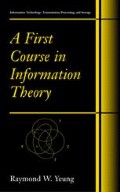Abstract
In a communication system, we try to convey information from one point to another, very often in a noisy environment. Consider the following scenario. A secretary needs to send facsimiles regularly and she wants to convey as much information as possible on each page. She has a choice of the font size, which means that more characters can be squeezed onto a page if a smaller font size is used. In principle, she can squeeze as many characters as desired on a page by using a small enough font size. However, there are two factors in the system which may cause errors. First, the fax machine has a finite resolution. Second, the characters transmitted may be received incorrectly due to noise in the tele phone line. Therefore, if the font size is too small, the characters may not be recognizable on the facsimile. On the other hand, although some characters on the facsimile may not be recognizable, the recipient can still figure out the words from the context provided that the number of such characters is not ex cessive. In other words, it is not necessary to choose a font size such that all the characters on the facsimile are recognizable almost surely. Then we are motivated to ask: What is the maximum amount of meaningful information which can be conveyed on one page of facsimile?
Access this chapter
Tax calculation will be finalised at checkout
Purchases are for personal use only
Preview
Unable to display preview. Download preview PDF.
Author information
Authors and Affiliations
Rights and permissions
Copyright information
© 2002 Springer Science+Business Media New York
About this chapter
Cite this chapter
Yeung, R.W. (2002). The Science of Information. In: A First Course in Information Theory. Information Technology: Transmission, Processing and Storage. Springer, Boston, MA. https://doi.org/10.1007/978-1-4419-8608-5_1
Download citation
DOI: https://doi.org/10.1007/978-1-4419-8608-5_1
Publisher Name: Springer, Boston, MA
Print ISBN: 978-1-4613-4645-6
Online ISBN: 978-1-4419-8608-5
eBook Packages: Springer Book Archive

